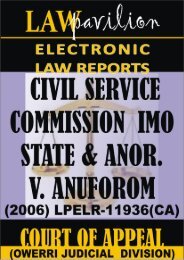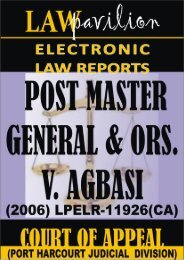LawPavilion Electronic Law ...
LawPavilion Electronic Law ...
LawPavilion Electronic Law ...
Create successful ePaper yourself
Turn your PDF publications into a flip-book with our unique Google optimized e-Paper software.
instant matter. That said; if I may repeat<br />
there can be no argument about it that no<br />
pre-action notice has been served on the<br />
respondent as required by Section 26(2)<br />
(supra); the appellant has not controverted<br />
that point and the consequences are trite and<br />
obvious. See: Madukolu v. Nkemdilim (1961)<br />
2 NSCC.374 - a case that has settled the<br />
ingredients of jurisdiction to include inter alia<br />
that a case has to be initiated by due process<br />
of law and upon fulfillment of any condition<br />
precedent to the exercise of jurisdiction. Any<br />
defects in these respects render the entire<br />
proceedings incompetent; in this case for<br />
failing to serve pre-action notice on the<br />
respondent as provided by Section 26(2). The<br />
question of non-service of pre-action notice<br />
ought to be taken as conceded by the<br />
appellant on the peculiar facts of this matter<br />
as it is evident that the appellant has never<br />
claimed to have done so... And I so hold. It<br />
therefore follows that once it is established<br />
that the respondent is entitled to be so served<br />
with pre-action notice on the circumstances of<br />
this case then on the facts of the appellant's<br />
action, the instant action in its entirety<br />
becomes incompetent (the pre-action notice<br />
not having been served on the respondent)<br />
and the court is therefore, not clothed with<br />
the jurisdiction to entertain the action. See:<br />
Madukolu v. Nkemdilim (supra). The overall<br />
implication of my reasoning above is that the





